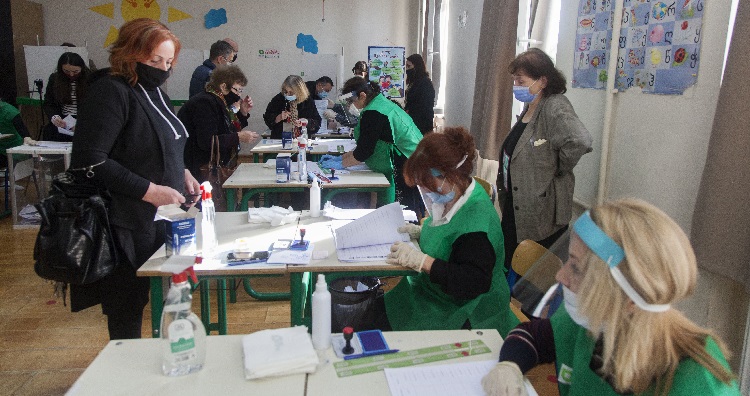Int'l observers: parliamentary elections were competitive, fundamental freedoms were respected

The international observers said 'the voting process was transparent and procedures were mostly followed’ in the polling stations visited. Photo: Nino Alavidze/Agenda.ge
“Georgia’s parliamentary elections were competitive and, overall, fundamental freedoms were respected”, the OSCE Office for Democratic Institutions and Human Rights (ODIHR) said in its preliminary statement today.
The OSCE/ODIHR meanwhile noted that, nevertheless, ‘pervasive allegations of pressure on voters and blurring of the line between the ruling party and the state reduced public confidence in some aspects of the process’.
Although the mission members visited a limited number of polling stations in 28 of the 64 municipalities,‘the voting process was transparent and procedures were mostly followed’ in the polling stations visited.
The competitive nature of yesterday’s elections was, unfortunately, undermined by the pervasive allegations we heard of the intimidation of voters, both in the lead up to and on election day, and of the blurring of the line between state and party during the campaign,” the head of the OSCE/ODIHR election observation mission Jillian Stirk said at a press conference in Tbilisi today.
Head of the delegation from the Parliamentary Assembly of the Council of Europe (PACE) Tiny Kox gave a nod to ‘all the brave Georgian voters who cast their votes in yesterday’s elections, despite the risk COVID might cause to them when visiting a polling station’.
To challenge immediately the results after the elections is not the best signal of a mature democracy, Tiny Kox later said during the Q&A session.
He then noted that he would ‘urge all parties to first see what the results are of the elections, then overlook them, then if needed to use the possibilities that there are to complain and then to come to conclusion what the results of this elections are’.
But challenging them on a same day as this elections have taken place is not the sign of a mature democracy and calling for rallies on the day of the elections and after the elections is in my humble opinion also not the best sign that you respect the decision of your voters, which came in larger proportion than four years ago to the bullet boxes under this difficult circumstances”, he said.
He meanwhile called on the Georgian politicians and the new Georgian parliament to meet as soon as possible the PACE’s ‘persistent recommendations to improve the legal framework regarding oversight of campaigns’.
While acknowledging that these parliamentary elections were generally free, he said the PACE representatives 'do pity' that Georgia 'still lacks clear rules on abundant and unlimited campaign spending, this negatively affects the fairness of your elections'.
Fundamental freedoms respected in #Georgia parliamentary elections, but confidence reduced by allegations of pressure and blurring of line between party & state, international observers say. Read our press release ➡️ https://t.co/BnGeQWFak3. pic.twitter.com/JlCnYHQAjy
— OSCE/ODIHR (@osce_odihr) November 1, 2020
Head of the delegation from the NATO Parliamentary Assembly (NATO PA) Osman Askin Bak said “this was an important election for Georgia’s transition to a parliamentary system of government’.
Georgian voters, once again, demonstrated their strong commitment to democracy despite the exceptional challenges posed by the pandemic. We observed a competitive election in which fundamental freedoms were generally upheld and most procedures were followed”, he said.
Noting that this was ‘far from flawless’ Osman Askin Bak said ‘a number of issues in the implementation created a somewhat uneven playing field and affected public confidence in parts of the process’, which must be addressed.
OSCE Special Co-ordinator and leader of the short-term OSCE election mission Elona Gjebrea Hoxha, also said she is ‘very pleased’ to contribute to the observation of these ‘very important and challenging elections for Georgia’.
I commend the extra efforts that inevitably had to be made in preparations, and also commend all the people who courageously decided to go out and vote, notwithstanding the immense challenges posed by the COVID-19 pandemic,” she said.
ODIHR press conference was held in Tbilisi earlier today:
The ruling Georgian Dream party has won the parliamentary elections of October 31 with over 48% of votes, based on the official results of the Central Election Commission (CEC)
Its candidates won the majoritarian race in the first round of elections in 14 of 30 majoritarian constituencies, while a second round of elections on November 21 is expected to take place in 14 constituencies, including in all eight constituencies in Tbilisi.
However, opposition parties which surpassed the one percent election threshold in Saturday’s parliamentary elections or nearly did so do not recognise the CEC results.
Claiming they will not take up their mandates in parliament they instead plan to take to the streets and call for repeat elections.
 Tweet
Tweet  Share
Share